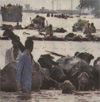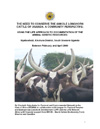Pakistan floods threaten livelihoods of livestock keepers

The floods in Pakistan have decimated stocks of animals, says Abdul Raziq Kakar, president of the Pakistani NGO SAVES. It is vital for people’s livelihoods to save as many animals as possible, and to help farmers and livestock keepers restock their herds.
“Every animal we save is a productive asset that poor families can use to rebuild their lives when the floods finally pass. The main priority and challenge is to get feed to those animals that have survived as much of the country’s traditional animal feed straw and forage has been lost in the floods”, says Abdul Raziq. “For buffalo and cattle, it is essential to enable the herds to rebuild quickly during the next breeding season. It is also imperative to get medicines to animals that have fallen weak or sick because of the disaster.”
Download Abdul Raziq’s report “Floods, river Indus and the local livestock breeds in Pakistan”
Ugandan cattle keepers document their breed

Ankole cattle in southwestern Uganda are well-known for their massive horns. Now this breed has been documented by the people who keep it for the first time.
Elizabeth Katushabe of the Pastoral and Environmental Network in the Horn of Africa (PENHA) coordinated the documentation effort, in collaboration with LPP and the Local Livestock for Empowerment (LIFE) Network. The resulting book is available in English and Kinyankole, the local language.
Katushabe, E. 2009. The need to conserve the Ankole Longhorn cattle of Uganda: A community perspective. Pastoral and Environmental Network in the Horn of Africa (PENHA), League for Pastoral Peoples and Endogenous Livestock Development (LPP) and the LIFE Network.
Minister launches LPP book on biocultural protocols

Tamil Nadu’s Minister for Animal Husbandry, Thiru Pongalur N. Palanisamy, has launched LPP’s latest book, Biocultural community protocols for livestock keepers.
Biocultural community protocols are a new approach with great potential for empowering pastoralists and other traditional livestock-keeping communities. They are both a process and a document in which communities invoke their rights as guardians of biological diversity under Article 8j of the United Nations Convention on Biological Diversity. Claiming rights for in-situ conservation, they also help promote Livestock Keepers’ Rights to maintain their breeds and continue their traditional management practices.
Biocultural community protocols put on record traditional knowledge and the biodiversity that communities steward, in a process that the communities themselves drive. In developing a biocultural community protocol, communities become informed about national and international laws that protect their rights. The book provides an overview of the process as well as its legal background and describes the first experiences with implementing this approach by livestock keepers in Asia and Africa.
The Minister launched the book at a meeting of livestock keepers at Kuttupalayam, Tamil Nadu, India, in August 2010.
League for Pastoral Peoples and Endogenous Livestock Development, and Local Livestock for Empowerment Network. 2010. Biocultural community protocols for livestock keepers. Lokhit Pashu-Palak Sansthan (LPPS). Sadri, Rajasthan, India
Download book 825 kb
- Go to the previous page
- 1
- …
- 35
- 36
- 37
- 38
- 39
- 40
- 41
- …
- 76
- Go to the next page
